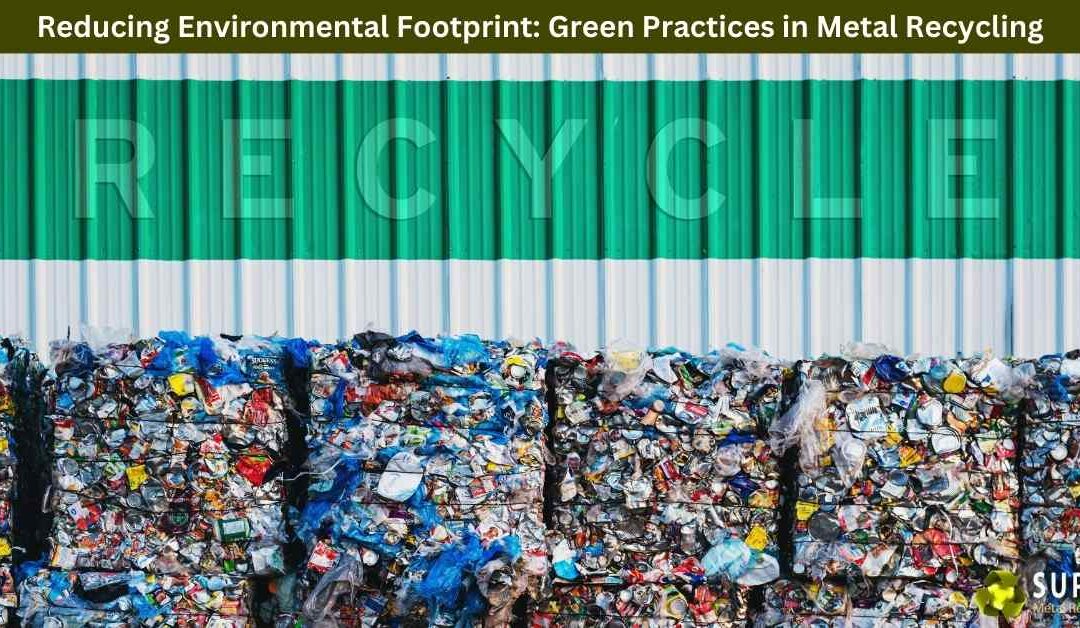In an era where environmental sustainability is at the forefront of global consciousness, industries are increasingly turning to green practices to reduce their ecological footprint. One such sector making significant strides in this regard is metal recycling. As a prominent metal recycling company in Melbourne, Victoria, we recognize the pivotal role our industry plays in shaping a sustainable future. This blog explores the various green practices in metal recycling that not only benefit our environment but also contribute to the circular economy.
I. The Environmental Impact of Metal Production:
To understand the significance of green practices in metal recycling, it’s crucial to first comprehend the environmental impact of primary metal production. Traditional methods of extracting and refining metals, such as mining and smelting, generate substantial carbon emissions, deplete natural resources, and contribute to soil and water pollution. By shifting towards a circular economy model, where metals are recycled and reused, we can mitigate these detrimental effects and pave the way for a greener future.
II. Energy-Efficient Metal Recycling:
One of the key green practices in metal recycling is the emphasis on energy efficiency. Traditional metal production processes demand enormous amounts of energy, often derived from non-renewable sources. In contrast, recycling metals requires significantly less energy. Aluminum, for instance, can be recycled using just 5% of the energy required for primary production. By prioritizing energy-efficient methods, metal recycling not only conserves valuable resources but also reduces greenhouse gas emissions associated with energy consumption.
III. Closed-Loop Recycling Systems:
Closed-loop recycling systems are integral to green practices in metal recycling. These systems involve collecting, processing, and reusing metals in a continuous cycle. By keeping materials within the loop, we minimize the need for new raw materials, subsequently reducing the environmental impact associated with extraction and refining. Closed-loop systems contribute to resource conservation and exemplify a sustainable approach that aligns with circular economy principles.
IV. Technological Innovations in Metal Recycling:
Advancements in technology have played a pivotal role in enhancing the efficiency and sustainability of metal recycling processes. State-of-the-art separation techniques, such as advanced shredding and magnetic separation, enable the extraction of valuable metals from complex waste streams. Additionally, innovations in metallurgy have facilitated the recycling of alloys, further expanding the scope of materials that can be responsibly reused.
V. Waste Reduction and Emission Control:
Green practices in metal recycling extend beyond the recycling process itself to include waste reduction and emission control measures. By implementing stringent waste management protocols and investing in emission control technologies, metal recycling companies can minimize their environmental impact. This not only enhances the overall sustainability of the industry but also contributes to the creation of cleaner and healthier communities.
VI. Public Awareness and Education:
Fostering public awareness and education is a crucial aspect of promoting green practices in metal recycling. By informing individuals and businesses about the environmental benefits of recycling metal, we can encourage greater participation in recycling programs. Moreover, raising awareness about the importance of segregating and disposing of metal waste responsibly is essential for the success of recycling initiatives.
VII. Collaborations and Partnerships:
Creating a sustainable future requires collaborative efforts from all stakeholders. Metal recycling companies can actively engage in partnerships with manufacturers, government agencies, and environmental organizations to promote sustainable practices across the supply chain. Collaborations can lead to the development of innovative solutions, policy advocacy, and the establishment of industry-wide standards for responsible metal recycling.
In conclusion, the metal recycling industry in Melbourne, Victoria, has a crucial role to play in reducing environmental footprints through the adoption of green practices. From energy-efficient processes and closed-loop recycling systems to technological innovations and waste reduction measures, there are numerous avenues for creating a more sustainable metal recycling sector. By prioritizing these practices, we not only contribute to the preservation of our planet but also set the stage for a circular economy where resources are conserved and reused, ensuring a greener and more sustainable future for generations to come.
If you are in Mulgrave, Victoria 3170, and looking for a metal recycling service, this is the best way to visit us.
Super Metal Recycling
345 Frankston – Dandenong Road, Dandenong South VIC 3175
(03) 9706 4909


Recent Comments